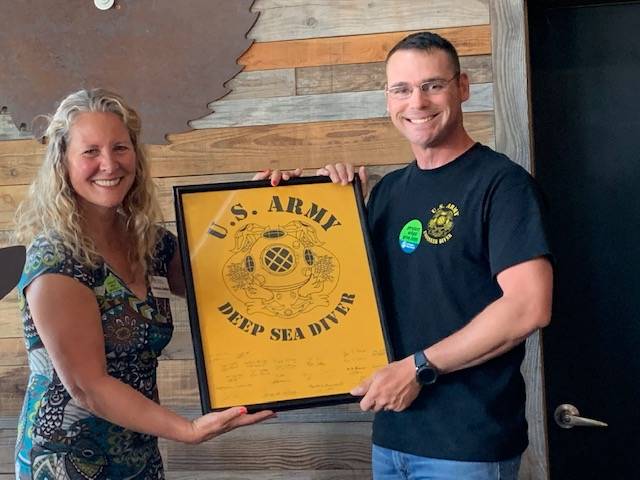The U.S. Army 569th Deep Divers were presented with the “Fin Award” from the Friends of the San Juans. The award honors individuals working to protect the Southern resident orcas, which the divers were able to accomplish by retrieving derelict nets off the west side of San Juan Island.
“We certainly do feel appreciated,” Commander Tyler LeRoy told the crowd at San Juan Island Brewing Company on July 25, when Stephanie Buffum, executive director of Friends of the San Juans, gave the team the award. Divemaster Thomas Kneipp presented Buffum with a signed plaque from the 569th, to the nonprofit environmental organization in return.
The 20 soldiers retrieved an estimated 10 nets, according to LeRoy. Most of those nets were gill nets from the 1950s and ‘60s and made from heavier material than modern nets. The largest gill net they collected, which was one such older net, weighed approximately 8,000 pounds.
“We started pulling, and it just kept coming,” LeRoy said with a laugh.
The soldiers completed approximately 40 dives during their stay from July 8-26.
“That might not sound like a lot, but depths of 152 feet, like what we were doing, the dives have to be short,” LeRoy said, adding that if a diver were to become tangled for as few as five minutes, they could die.
Hiring civilian divers to remove the nets would not be cost-effective, he continued, given the time and skills involved.
Yet, according to Joan Drinkwin, Natural Resources Consultants principle, it is important these nets be removed because they entangle fish, birds and even mammals, causing enormous environmental damage.
“Once these nets are removed, the environment recovers in that area almost immediately,” Drinkwin said during a lecture at The Whale Museum on June 25.
There are estimated to be more than 200 deep-water nets in water deeper than 150 feet deep in San Juan County, with many of those along the west side of San Juan Island.
The Washington State Department of Fish and Wildlife, contracting with Natural Resources Consultants, has been working to remove these nets all across the Salish Sea. The Army, meanwhile, has soldiers in need of dive training. In a win-win situation, the Army Deepwater Derelict Net Removal Project has given soldiers crucial practice by pulling up deep-water derelict nets.
The Army provided a decompression chamber and other necessary dive equipment in preparation for the dives, Drinkwin explained, and contracted with a local business for the vessel. The Washington State Department of Natural Resources provided disposal of the nets and paid for the local project management.
During their stay, LeRoy said, the soldiers hit their training targets. The frigid temperatures, strong currents and depths involved were the perfect recipe for training.
“These waters are much more dangerous than [those in] Virginia, and we would have just been sinking a bunch of our own stuff anyway, to practice retrieving it,” LeRoy said.




